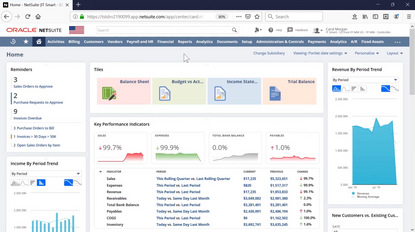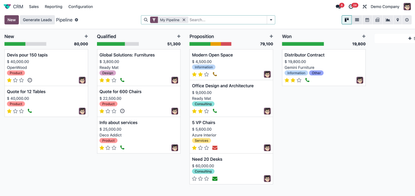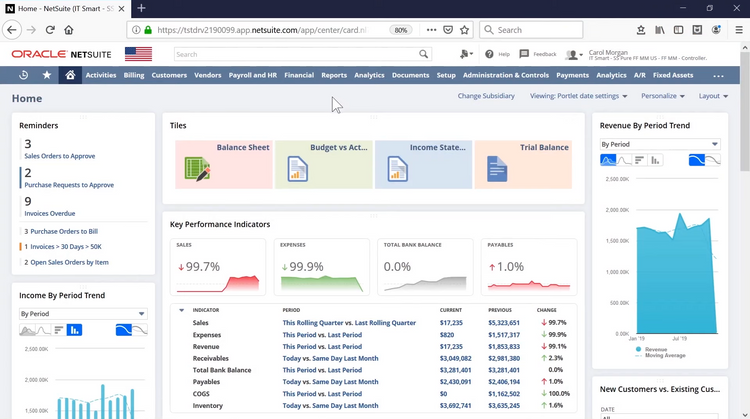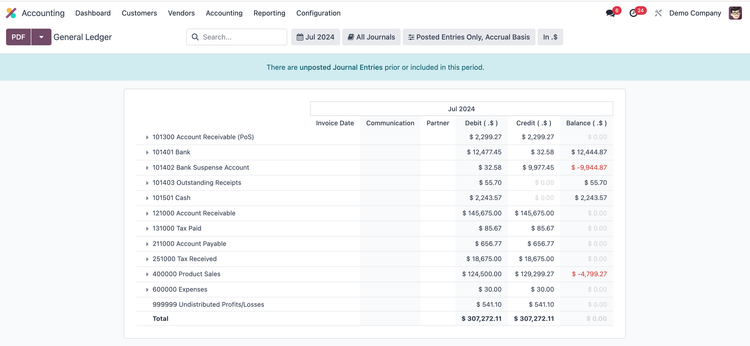NetSuite ERP vs. Odoo: A Hands-On Review
NetSuite and Odoo are two leading ERP solutions for small to midsize businesses. While having similarities, they also have distinct differences in their ideal target markets, features, and customizations. NetSuite, acquired by Oracle in 2016, is one of the most popular ERPs on the market and is used by over 38,000 businesses. On the other hand, Odoo has emerged as another common choice for companies due to its modular architecture and pricing.
After considering these, we found that Odoo is best for small businesses with under 50 employees, while NetSuite is better suited for midsize companies with 50-200 employees, explained in our reasoning below.


Modularity
NetSuite offers a standardized, integrated solution with several core ERP modules in one package. While other modules can be integrated later, the system is not designed with a pick-and-choose system in mind. While some companies may find this a hindrance, many enjoy the all-in-one nature, as it eliminates integration headaches and makes the modules feel like one cohesive product.
Odoo is modular by design, allowing companies to select only the modules they want from its 30 options. This flexibility is desired by small businesses that don’t want to pay for features they don’t need and build their ERP piecemeal as they scale. However, this can lead to high costs as more modules are required, and an in-house IT team is required to customize its open-source code.
Core Features
NetSuite
NetSuite offers strong financial management features, including an advanced audit trail and in-depth reporting capabilities. Its multi-currency and multi-entity functions allow it to support global businesses. Financial managers can drill down into individual transaction records from reports for real-time, specific data analysis.
NetSuite also offers many customization options and a large third-party app integration store. It offers industry-specific editions and seamlessly integrates with eCommerce platforms, POS applications, and more. However, while it boasts a large number of functionalities, there is a learning curve, so expect to invest in staff training.

Odoo
As previously mentioned, Odoo offers 30 ERP modules for businesses to choose from, covering accounting and finances, HR, inventory, manufacturing, sales, and eCommerce. Its open-source architecture allows businesses to customize it to their unique workflows. Like NetSuite, third-party apps can be added to enhance its functionality.
Odoo serves as a light ERP for businesses looking for more basic functionality compared to NetSuite. Its accounting module allows for streamlined invoice generation, bank reconciliation, and efficient journal entries. Its inventory module is also strong, offering a double-entry system. It has an intuitive interface and modern UI, helping first-time users acclimate fast.

Pricing Considerations
NetSuite ERP is more expensive than Odoo, especially with its implementation fees and annual subscription plans. NetSuite’s most basic plan starts at $1,299/month plus $99/user/month and other implementation fees.
Odoo offers a significant advantage with its community version — it’s free. However, as your requirements grow and you opt for more functionalities, you’ll be required to pay for either the standard plan or custom plan on the commercial enterprise version, starting at $31.10/user/month. Also, Odoo offers upgrades, but they aren’t free.
Deployment & Accessibility
Both ERP solutions are web-based, ensuring ease of access. NetSuite is strictly cloud-hosted, which is a plus for businesses not looking to manage on-premises infrastructure. Odoo gives you a choice: you can either go for cloud-hosted or manage it on-premises, providing flexibility based on your resources and technical capabilities.
Our Recommendation
If you’re a medium-sized business (over 50 employees), especially in sectors like IT, distribution, or professional services, and are ready to invest in standardized, customizable ERP solutions, NetSuite ERP is likely a solid choice. Its integrations, industry-specific focus, and cloud hosting make it an attractive option.
However, for smaller businesses (under 50 employees) or those looking for cost-effective, modular solutions, Odoo is a solid option. Its open-source nature, free community version, and flexibility in adding modules make it a great choice for businesses on a tighter budget or with customized needs.
